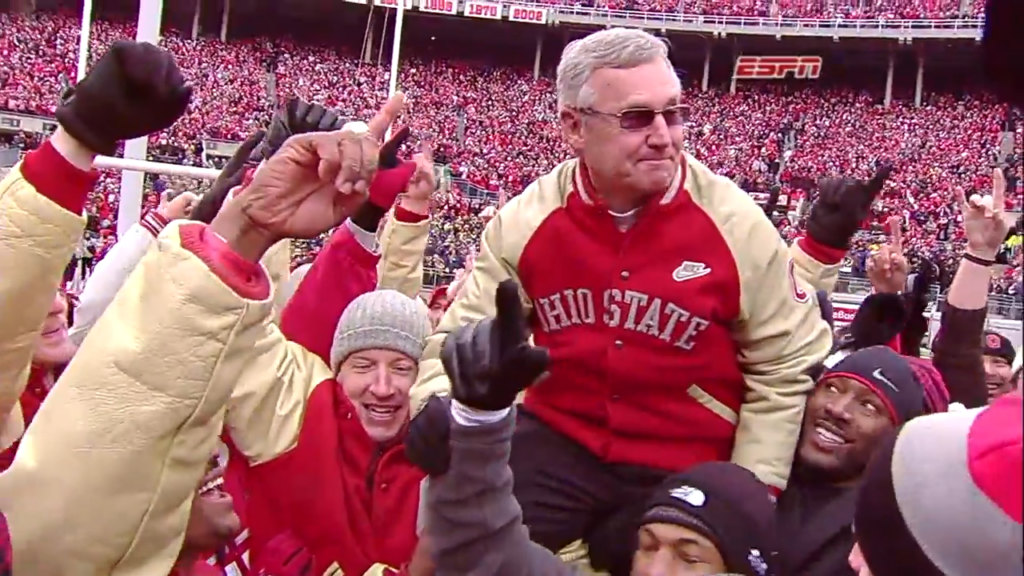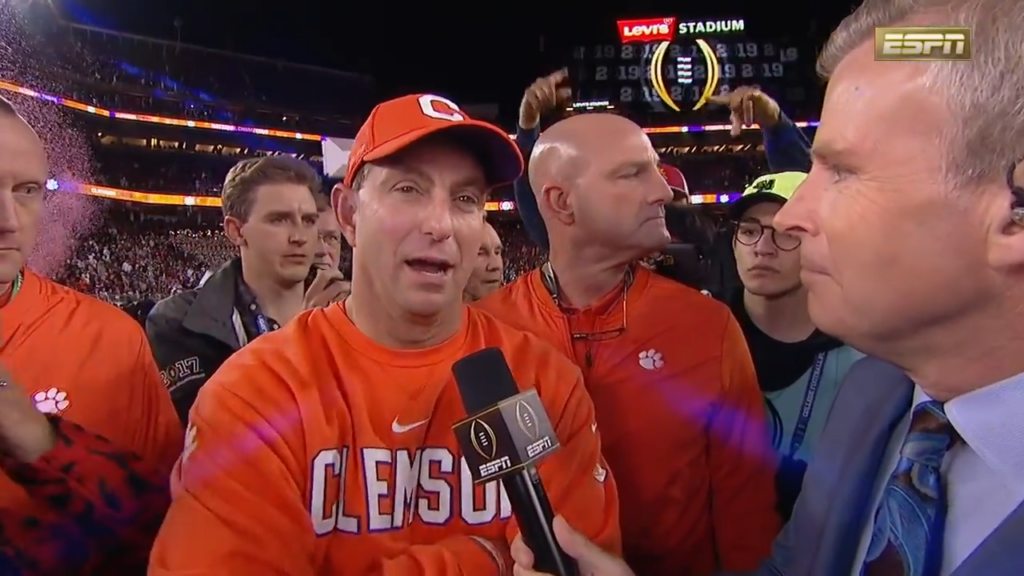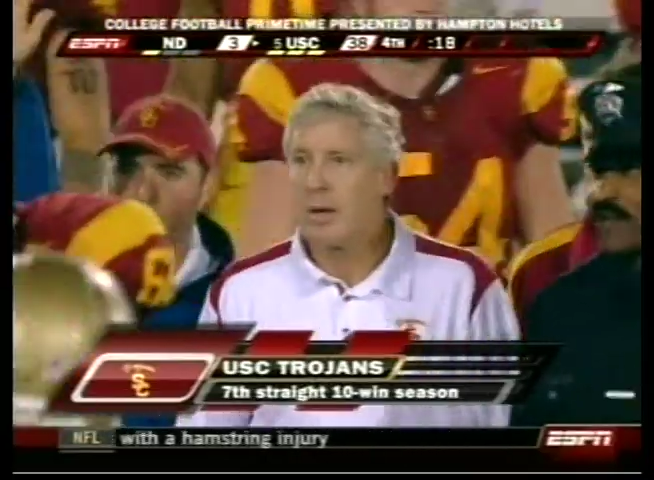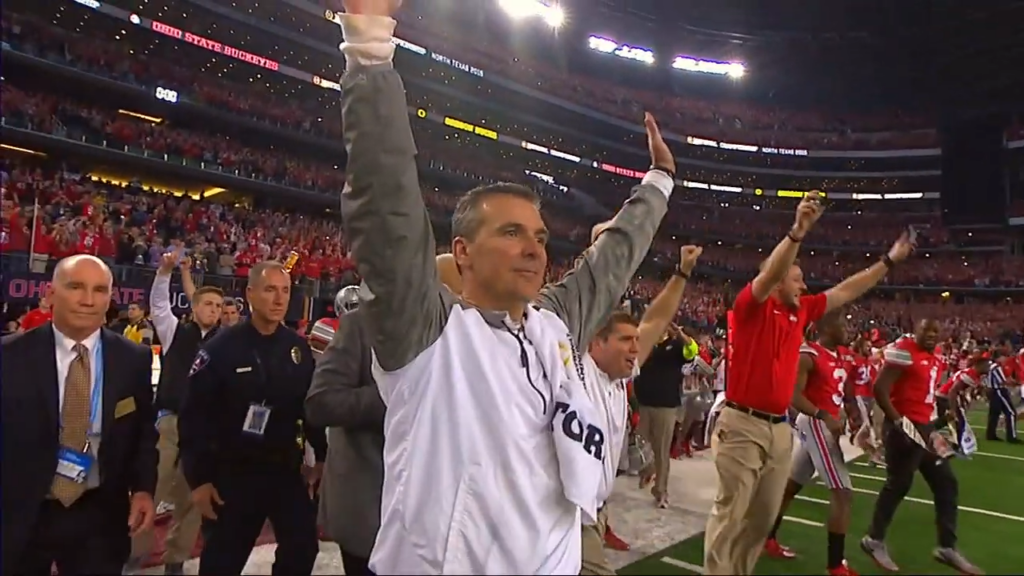Intertwined with the oncoming of the Fall is the return of the college pigskin to the gridiron. The influx of pre-season postulations, off-season roster restructuring, and speculation about the prospects of incoming recruits, can all grind to an unceremonious halt. Finally, in place of mere hypothesis, clarity will be enhanced by a profusion of on-field results.
To effectively announce the arrival of the 2024 college football season, we’ll reflect on seasons past, on the legacy of coaches whose achievements have transformed into legend. During the 21st century, new goliaths emerged on the sidelines, either streamlining the success of existing juggernauts or fashioning behemoths out of heretofore spendthrift operations. In this article, we’ll examine the 5 best college football coaches of the 21st century, assessing them according to their overall achievement, the context of the program(s) they either resurrected or sustained, and the legacies they crafted.
5. Jim Tressel

Program: Ohio State
Overall Record: 229-29-2
Championships: 1 (2002)
Tenure: Tressel’s career trajectory is peculiar among college football coaching legends. His characteristic moderation and stoicism rendered him largely uninteresting to most media observers, who seldom touted his astounding consistency at Ohio State. Tressel’s career began earlier than the Horseshoe, however, at Youngstown State, where he served as a university administrator and head college football coach. At the D I-AA level, Tressel engineered a swift turnaround of the moribund program, winning the Ohio Valley Conference in his second year. In 1991, his program now fully manifest, Youngstown won the D I-AA national championship for the first time. In two of the next three years, Youngstown State also won the national championship, against more well-regarded foes Marshall and Boise State. In 1997, Tressel won his last national championship with Youngstown State, his star seemingly burning brightly.
When John Cooper was relieved of his duties at Ohio State following a loss to unranked South Carolina in the Outback Bowl, Jim Tressel was anointed as his successor in 2001. He commenced to guide Ohio State to two 19-game winning streaks, one which spanned the 2002-2003 seasons; and the other which occurred during the 2004 and 2005 campaigns. This amalgamation of winning culminated in a national championship in 2002, where Ohio State defeated heavily-favored Miami in the 2003 Fiesta Bowl. Tressel proceeded to coach Ohio State to 3 more seasons with 11 or more victories. He won 6 Big 10 championships, boasted a 9-1 record against arch-rival Michigan, and competed in 3 additional national championship games. Tressel later resigned from the program, after several of his players were found to have received discounted tattoos during his tenure as coach.
Legacy: Though he was perhaps more innovative than given credit for, Jim Tressel’s tenure at Ohio State became synonymous with “Tresselball.” It was regarded as a largely conservative scheme, designed to score just enough points, overwhelm opponents with swarming defense, and gain advantageous field position. Often referred to as “The Senator” or the “The Vest” because of his decorous comportment and affinity for staid vests on gameday, Tressel was widely respected throughout the college football world. He is now employed as the president at Youngstown State University while also engaging in philanthropic endeavors associated with Ohio State.
4. Dabo Swinney

Program: Clemson
Overall Record: 170-43
Championships: 2 (2016, 2018)
Tenure: In 2002, Swinney’s coaching career received what would become a hugely significant boon when we has offered the Wide Receivers Coach position by Tommy Bowden, at Clemson University. In conjunction with his offer, he also took on the role of recruiting coordinator previously occupied by Rick Stockstill. When Tommy Bowden was summarily terminated in 2008, Swinney was given the interim-position while the university conducted a national search for a new head coach. After a vote of confidence from Athletic Director Terry Don Phillips, Swinney was eventually promoted to head coach on December 1, 2008.
Swinney’s reputation as an aggressive recruiter proved accurate, as he quickly signed successive top 10 recruiting classes. By 2011, enough momentum had sufficiently accrued to render Clemson a burgeoning national power, when it finished the season 11-2. In 2015, Clemson asserted its dominance forcefully, finishing 14-1 and appearing in the national championship game against Alabama, where it ultimately fell in a thriller, 45-40. The following year, Clemson would conquer its demons, prevailing over Alabama in the Fiesta Bowl to win its first national championship in program history. In 2018, under the auspices of wunderkind freshman QB Trevor Lawrence, Clemson finished with a perfect record and an additional national championship.
Swinney’s career has soured in recent years. While Clemson remains a perennial power, it no longer exists within the rarefied air of other programs.
Legacy: Swinney remains the head coach at Clemson, so his entire legacy is still to be written. While his past history cannot be ignored, the ongoing discourse at Clemson revolves around Swinney’s ability to effectively adapt to emerging trends in the college football landscape. Especially with the advent of the transfer portal, which has unsettled roster stability, critics of Swinney’s argue an increasing necessity to evolve with the shifting times. However his career at Clemson concludes, Swinney will nevertheless still be revered for his elevation of Clemson from a merely upper-echelon college football program to a truly elite one.
3. Pete Caroll

Program: USC
Championships: 2 (2003 *contested*, 2004 *vacated*)
Overall Record: 97-19
Tenure: The hiring of Pete Carrol at USC was largely met with acrimony once the decision was released. Fresh off of a tumultuous 4 years under the regime of Paul Hackett, SC was more interested in hiring a head football coach with a record of recent success at the collegiate level. After hotly pursuing both Oregon State head coach Dennis Erickson and Oregon head coach, Mike Bellotti, administrators at SC were vexed. After engaging in a brief dalliance with Mike Riley, the head coach of the Chargers, SC ultimately settled on Caroll, who previously had had a largely unsuccessful stint with the New England Patriots.
Carroll, however, much to everyone’s astonishment, approached the position with charisma, vigor and energy. He harnessed the uniquely fertile recruiting grounds of Southern California to create a powerhouse in Los Angeles. After a blustery 2-5 start, Caroll’s team proceeded to go an astonishing 67-7 over the next 74 games. His teams won a record of 34 consecutive games from 2003 to 2005, won 2 national championships, and barely lost a third. From the doldrums of the 90s, Carroll completely resurrected a historically proud program, ushering in an era of sheer dominance that is almost without parallel.
Legacy: Carroll’s legacy at USC was somewhat tarnished for two reasons: running roughshod over NCAA bylaws while also unceremoniously departing the Trojans for the NFL as sanctions were being imposed. He left USC in a mire of scandal, desperately seeking to regain its footing after an NCAA sledgehammer had fallen. One of Carrol’s Heisman Trophy winners, Reggie Bush, was stripped of his award. Moreover, SC itself was imposed with scholarship restrictions and a two-year moratorium on post-season competition. The level of success Carroll achieved, however, cannot be ignored, even in spite of the repercussions that were enforced. For a relatively brief moment SC alone, with all of its glitz and glamour, was the reigning king of the college football world. It is difficult to wipe away memory.
2. Urban Meyer

Program: Utah, Florida, Ohio State
Overall Record: 187-32
Championships: 3 (2006, 2008, 2014)
Tenure: Meyer started his head coaching career inauspiciously at the University of Bowling Green in Ohio. There, almost straightaway, he was the architect of a stunning turnaround, posting an 8-3 record during his first year. Meyer continued to revamp and improve the upstart program, until larger suitors began to take notice.
In 2003, Meyer accepted the head coaching position at the University of Utah. In his first year as the Utes head coach, they went 10-2, earning Meyer the Mountain West Coach of the Year award. In 2004, the Utes were an even more formidable threat, capping an undefeated regular season record with a victory in the Fiesta Bowl against Pittsburgh. It was the Utes first perfect season since 1930.
In the wake of Meyer’s accomplishments, he accepted the position at the vaunted program of Florida, one of the SEC’s most decorated programs. Mired in a miasma of mediocrity since the departure of legend Steve Spurrier, Meyer promised to revive the program’s fortunes. After an acceptable first season, the renaissance of Gator football became truly evident during Meyer’s second campaign, where Florida finished 13-1, won the SEC championship, and ultimately, the national championship. Meyer’s next season, though replete with several setbacks, was nonetheless memorable for Tim Tebow’s ascension in the college ranks, winning the Heisman trophy during his sophomore season. In 2008, Florida once against found itself atop the college football landscape, winning a second national title against Ohio State. In 2009, after experiencing a set of unnamed health issues, Meyer took an extended leave of absence from the University of Florida. After returning briefly in 2010, Meyer announced his retirement shortly thereafter.
After a temporary absence from college football, Meyer returned with force in 2012, accepting the open position at Ohio State. His first season kicked off with rollicking enthusiasm, as Meyer’s Buckeyes completed a 12-0 season. Were it not for NCAA sanctions, the Buckeyes would have competed in the national championship. In 2014, the stars once again aligned in Columbus, as Ohio State marched to a 12-1 regular season record and an eventual victory over Oregon in the National Championship Game. The remainder of Meyer’s tenure at Ohio State was marked with sustained excellence, but also the absence of any additional championships. In 2018, Meyer was implicated in a cover-up of one of his assistant coach’s spousal abuse and he later resigned his position.
Legacy: Meyer’s legacy is inextricably bound to his embrace of the spread offense, which revolutionized offense across college football. An offshoot of Bill Walsh’s West Coast Offense, Meyer similarly relied on execution, short routes, and reliable receivers. Meyer, however, tinkered with Walsh’s sets, primarily lining up in the shotgun with three receivers spread across the line of scrimmage. He’d then introduce elements of the traditional option, putting players in pre-snap motion, often executing a run play when he was showing pass. It discombobulated defenses to great effect. Meyers ability to continually experiment with his schemes, largely on the basis of available personnel, was one of the primary reasons for his momentous success.
1. Nick Saban

Program: LSU, Alabama
Overall Record: 292-71-1
Championships: 7 (2003, 2009, 2011, 2012, 2015, 2017, 2020)
Tenure: Though he had previous coaching stops prior to Baton Rouge, Saban’s career arc truly ascended with his success at LSU. Hired in 2000, Saban leveraged the latent talent available in the Deep South to craft a dynamic foundation in Louisiana. In his second season as the Tigers head coach, Saban won an SEC championship. By 2003, his rebuilding project had been completed, as LSU won the national championship in the Sugar Bowl against the undefeated Oklahoma Sooners. Following 2004, Saban exited the college ranks to briefly coach in the NFL.
Saban, however, was eventually drawn back to college football when Alabama came calling. In 2007, Saban accepted the position to become the new head coach of the Crimson Tide, one of the most storied programs in college football. Alabama’s immediate elevation was almost a foregone conclusion. With the Crimson Tide, Saban would go on to win 11 SEC championships, coach 4 Heisman winners, compete in 9 college football playoffs, and win 6 national championships. His hegemony over the sport for two decades remains an astounding feat. He is arguably the greatest college football coach ever.
Legacy: Whatever sideline he traversed, with the exception of a professional one, Saban’s indelible mark was one of consistency. He has too many accolades to count. He made success look boring, more robotic than euphoric. Saban preached an ethos of hard work and discipline. He admonished players to constantly prioritize “the process,” to focus as intensely as one could on the play before them, rather than casting a glance at the scoreboard.
He may have been a dyspeptic old curmudgeon, but there was a method to his madness. His seven national championships confirm that.
For additional sports-related information, reference the following articles:
A Bird’s Eye View: The 2024 Olympics
Prolific Posterizers: The Most Disrespectful Dunks Of All-Time



